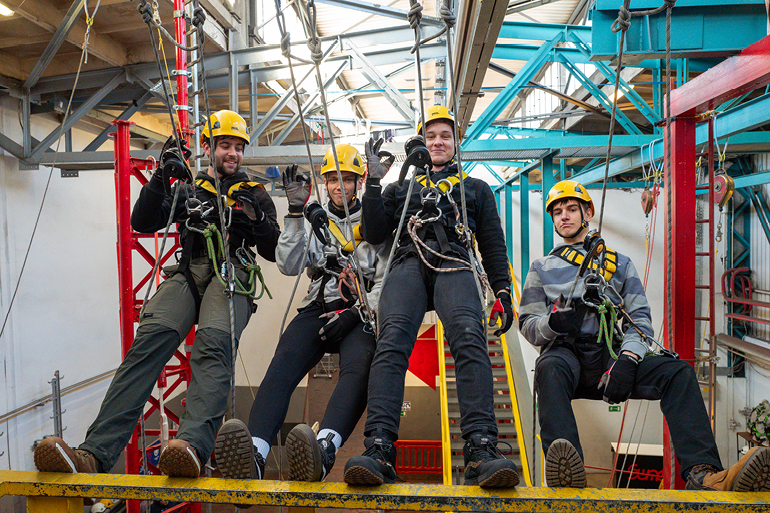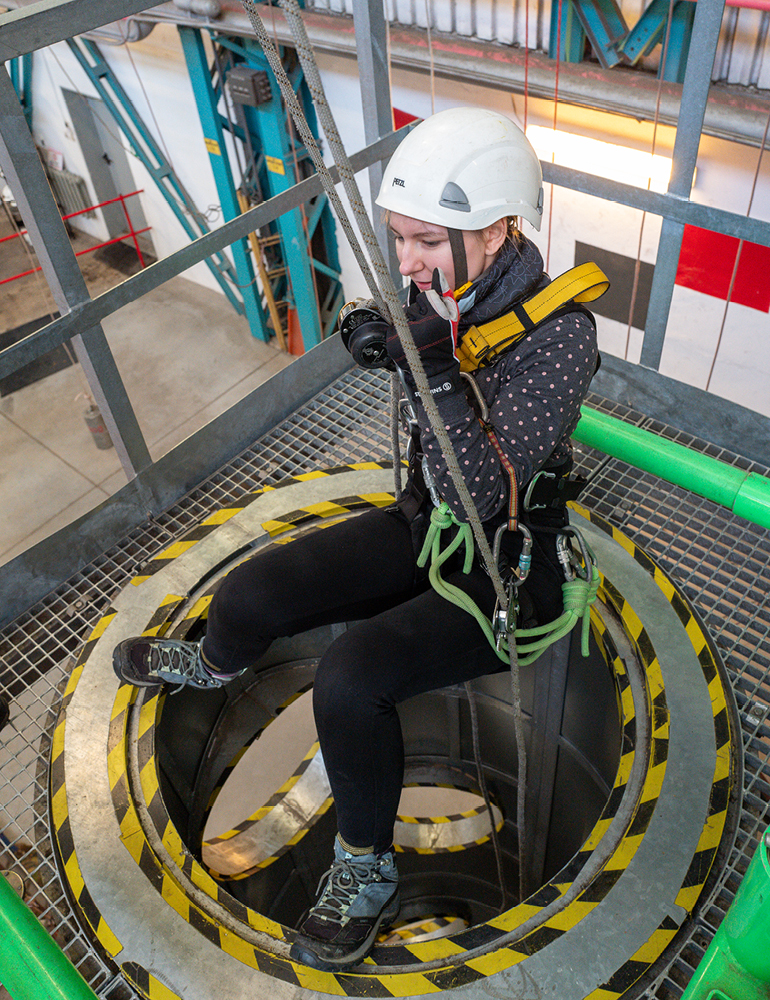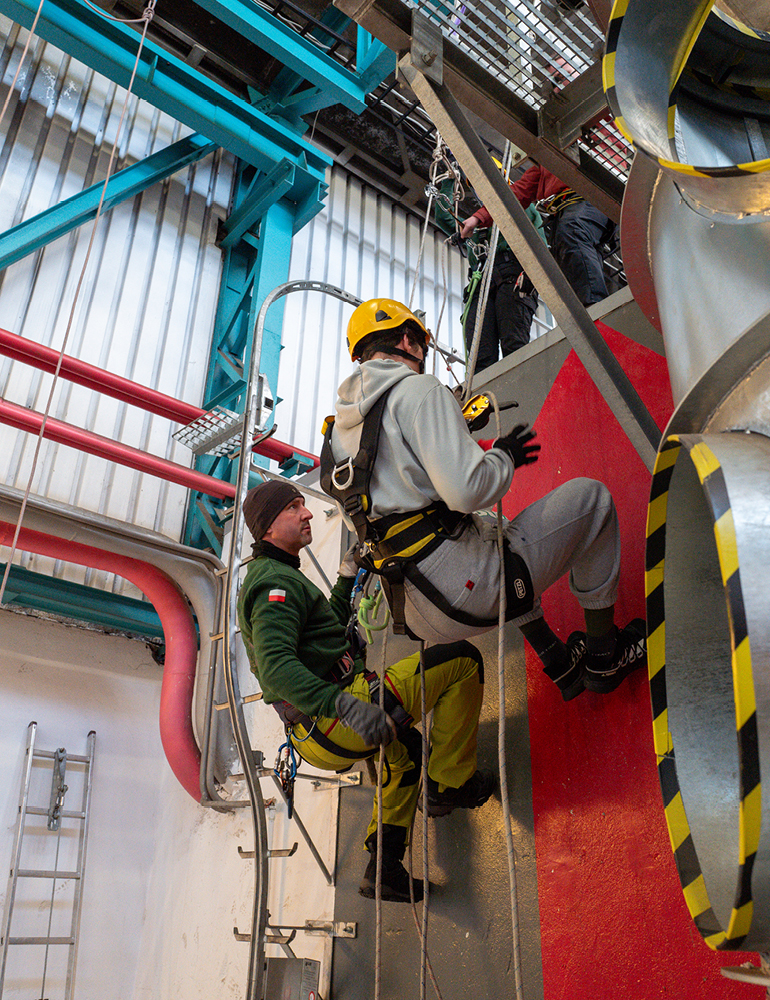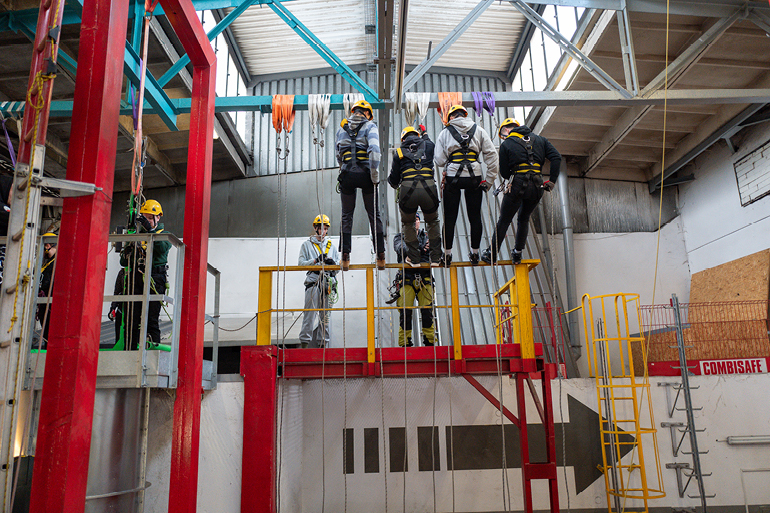Start - Aktualności - Students learn to work at heights

Students learn to work at heights
They know the theory, it is time to practice. We are talking about students of the Faculty of Electrical Engineering, who have an extraordinary opportunity to expand their qualifications, which in the future may be useful for them at work. They take part in the altitude course, which was organized as part of the European City of Science Katowice 2024 program in the City-Region-Academy band.
Thirty students are taking part in the high-altitude training since November 23rd . The course under the name “Altitude techniques in the work of an electrical engineer” is implemented from the program of the European City of Science Katowice 2024 in the City-Region-Academy band.
- The training is aimed at acquiring the skills necessary to work in modern power engineering, which is based on high-altitude structures such as wind power plants or solar panels placed on roofs - said Dr Eng. Marek Kciuk from the Department of Mechatronics of the Silesian University of Technology.
“An electrician must not only be an expert in electrical engineering, but also be able to get to the machines that he has to service in order to work efficiently,” he added.
Thanks to the training, students will obtain the first certificate entitling them to work at high altitudes.
- I do not yet know in what direction I will develop in the future and where I will find a job, so it is worth catching every opportunity, doing courses, because each of them can be useful. During classes at the University, it would not be possible to complete such training – added Wiktoria Szymska, a participant of the course.

Training is not only important, but also expensive. This would be a huge burden for the student budget. Thanks to the project, a large group has a chance to complete them completely for free. The participants of the training are students of the Faculty of Electrical Engineering, 24 in the field of Electrical Engineering and 6 in the field of Mechatronics.
- The recruitment of participants was two-stage. In the first stage, students active in scientific circles at the Faculty were proposed to participate, especially those who take part in the life of the Faculty and represent it at events such as the Silesian Night of scientists or the Science Picnic of the Polish Radio and the Copernicus Science Centre in Warsaw,” said Marek Kciuk.
The course is conducted by instructors from the Uniformed Services Instructors Association.
- We provide students with both theoretical and practical knowledge about working at heights and protection against falls from heights. We teach them from scratch, what equipment they can meet, how to operate it and what standards of work at heights in the international dimension apply – explained Robert Wasilewski, president of the association.

Throughout the course, participants will acquire the skills to operate personal protective equipment, including technical harnesses and safety devices and systems built into ladders, for example. They will also learn the basics of insurance, self-insurance, and high-altitude rescue.
The first day of the training began with a discussion of the principles of safety at work at height and during the course. Next, Robert Wasilewski – the main instructor, presented the methods of construction of rope stations and the theory related to rope techniques and work at heights. After the lecture, the group prepared for the practical part of the classes. First, they all dressed in technical uniforms. Later, in order to emphasize the importance of safety aspects and the need to cooperate in a group, each participant was checked three times to ensure that he was sure to put the equipment on well. Then, each participant was equipped with personal downhill and safety equipment. The first group learned to prepare the downhill stations, the other groups practiced the operation of the equipment, performing a series of conventions.
The downhill stations included a flat wall, exit from the window, a well and two types of balconies, from which one had to lean out and exit or additionally overcome the barrier to prevent falling.
After the practical part, the participants listened to a lecture on the construction, operation and maintenance of power lines and the associated necessity of working at heights.
The lecture was conducted by Dr Eng. Paweł Kubek from the Department of Electrical Power Engineering and Control Systems, Faculty of Electrical Engineering. Dr Kubek pointed out the different approach to work in this area in different countries, e.g. in the USA and France maintenance work is carried out on the running line. In Poland, although the line is switched off for this time, there are other electrical hazards arising, for example, from the presence of a working adjacent line on the same pole.
Already on the second day of the course there was a very large increase in self-confidence of the students with subsequent cable ties.

It is worth noting that the course, apart from financial support from the City-Region-Academy of the European City of Science Katowice 2024 program, was also under patronage of KENO Company, whose business profile focuses on comprehensive renewable energy solutions.








